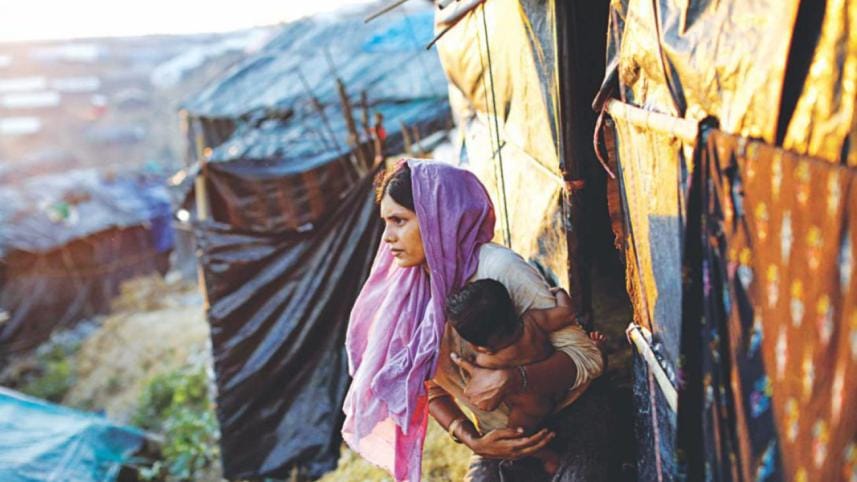The realities of Rohingya refugees - What do we do next?

In the last few days I had the opportunity to visit the Rohingya camps in Ukhia near the Myanmar border to observe the conditions of the refugees as well as the environment of the area. I will share some very preliminary observations on the situation.
The first is of course the overwhelming destitution of the refugees who have been forced to cross the border from Myanmar into Bangladesh with nothing but the clothes on their backs (and sometimes not even that).
Although the initial influx into Bangladesh of hundreds of thousands of these refugees caught everyone unawares and there was an element of chaos on our side of the border, since then the army has been deployed and there is now a semblance of order, with a number of camps being set up to house, feed and provide medical assistance to them. The circumstances are still dire, but at least there is some order.
It is certainly to the credit of the government and the people of Bangladesh that we have responded to this humanitarian crisis with humanity and a sense of solidarity with the incoming refugees. The support of the various UN agencies and other international allies and NGOs should also be acknowledged as a crisis of such magnitude cannot be shouldered by the government alone.
My second observation was the demographic make-up of the refugee population, somewhat unprecedented in that they consist overwhelmingly of small children, sometimes with their mothers but many being orphans. The number of pregnant young women was large and there were relatively few young men.
This fact presents a particular challenge for us: To cater to both the medical and educational needs of these babies, children and young women.
The third observation is the effect that the refugees and their camps are having on the environment of the area. Already, the forest department has allocated several thousand acres of forest land to set up the many camps (which are still being set up). The trees in that area have been totally decimated and even some wildlife has been affected as there are elephant trails in the vicinity (several refugees have been trampled by elephants).
While the immediate humanitarian assistance is paramount, some attention needs to be given to the environmental impact as the demand for dwellings and firewood for cooking will put a lot of pressure on the surrounding forest area.
Hence, we need to start thinking about how to deal with the problem in the longer term.
The immediate political and diplomatic efforts should, quite rightly, focus on persuading Myanmar to repatriate the refugees. However, any realistic assessment will tell us that we may not succeed in sending all of them back even with the most optimistic diplomatic scenario.
Therefore, we need to think of some long-term solutions to deal with this additional population in our country. This is indeed a highly complex problem with humanitarian, political, law and order, security, development and environmental concerns, all of which need to be taken into account. Nor do these problems have simple solutions.
I do not claim to have any solutions to this mega-problem for Bangladesh, but would like to share a few thoughts.
The first conundrum to tackle is regarding where to house the refugees. In other words, should they be kept in confinement in camps or should they be allowed to disperse in the country? At the moment, the policy of the government seems to favour the former and locations are being made ready to transfer them from the camps they are in now.
However, confining refugees into camps for long periods of time has in the past (all over the world) proved to cause many more problems over time than they are supposed to solve in the short-term. Even though it is politically a very difficult choice for the government, it would be wise to think about allowing them to be resettled in different parts of Bangladesh.
The second aspect that I feel must be a basis for prioritising our support to them is the fact that so many of them are babies and young children. This means that we need to accept responsibility for their upbringing and make sure that they are educated.
There is genuine fear that they will resort to criminal behaviour and this situation is more likely to come true if they are neglected rather than educated.
Finally, as the prime minister has quite rightly said, if we can feed 160 million Bangladeshis then we can share our food with another million Rohingyas. But we need to extend this pledge beyond simply feeding them to helping them develop over time. It will certainly be a burden for a poor country like Bangladesh, but it would be the right thing for us to do.
Saleemul Huq is Director, International Centre for Climate Change and Development at the Independent University, Bangladesh.
Email: Saleem.icccad@iub.edu.bd




Comments